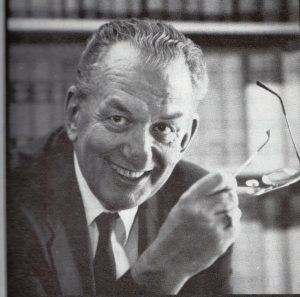
George Olah
University of Southern California
Professor George Andrew Olah received his B.S. and Ph.D. degrees from the Technical University of Budapest. After serving on the faculty of organic chemistry at this university from 1949 to 1954, he held the position of Head of the Department of Organic Chemistry and Associate Scientific Director of the central Research Institute of the Hungarian Academy of Sciences from 1954 to 1956. After emigrating to the United States, he was a Senior Research Scientist at Dow Chemical Company from 1957 to 1964. In 1965, he joined the Department of Chemistry, Western Reserve University (later Case Western Reserve University) serving as professor and chair of the department from 1965 to 1969, and as the C. F. Maybery Distinguished Professor of Research in Chemistry from 1967 to 1977. Since 1977, he has been on the faculty at the University of Southern California as Professor and as Scientific Director of the Hydrocarbon Research Institute and, in 1991, Director of the Loker Hydrocarbon Research Institute. In 1980, he was named Distinguished Professor of Chemistry and, in 1983, Donald P. and Katherine B. Loker Distinguished Professor of Organic Chemistry. Professor Olah has served as visiting professor at Ohio State University, the University of Heidelberg, The Swiss Federal Institute of Technology, the University of Munich, the University of Strasbourg, the University of London and the University of Paris. He holds honorary degrees from the University of Durham, the Technical University of Budapest, and the University of Munich.
Dr. Olah’s awards include the van’t Hoff Fellowship (Netherlands, 1956), the ACS award in Petroleum Chemistry (1964), the Leo Hendrick Baekeland Award (1967), J. S. Guggenheim Foundation Fellowships (1972 and 1988), the Morley Medal (1970), the Centenary Lectureship, British Chemical Society (1977), the ACS award for Creative Work in Synthetic Organic Chemistry (1979), the Alexander von Humbolt-Stiftung Award for Senior U. S. Scientists (1979), the Michelson-Morley Medal of Case Western Reserve University (1987), California Scientist of the Year Award (1989), and the ACS Roger Adams Award in Organic Chemistry (1989). He is a fellow of the Society for Promotion of Science, Japan, a member of the National Academy of Science and of the European Academy of Arts, Sciences and Humanities, Foreign Member of the Italian National Academy dei Lincei, and holds honorary membership the Italian Chemical Society and in the Hungarian Academy of Sciences. He has published over 900 scientific papers, holds about 100 patents, and has written or coauthored more than ten books.
Dr. Olah’s development of superacids — complexes of Lewis acids such as HF with substances such as SbF5 — provided chemists with proton donating media that are orders of magnitude stronger than concentrated sulfuric acid. This has allowed studies of the protonation of such weak Lewis bases as alkanes and made the formation of concentrated solutions of carbocations possible. Spectroscopic measurements — both NMR and optical — of superacid solutions of carbocation have provided detailed information about the structures of these important intermediates in organic reactions. His superacid research as also spurred the development of new acid catalysts for organic reactions and significant advances in methods of organic synthesis, particularly in Friedel-Crafts chemistry, alkylations and acylations and addition reactions to pi-electron systems. His original research on electrophilic methane conversions offers an alternative to the Fischer-Tropf synthesis as a route to the production of higher hydrocarbons. The practical possibilities of his research include the conversion of coal into synthetic hydrocarbon fuels.
Friday, March 20, 1992
Faculty Center
University of Southern California
Address: “Hydrocarbons — How They Affect Our Lives and What Can We Do About Them”
1991 Tolman Recipient, Dr. George Olah

1927-2017
It is with great sadness that we heard of the news of the passing of Prof. George Olah of the Loker Hydrocarbon Research Institute at USC. Prof. Olah was the Distinguished Professor of Chemistry, Chemical Engineering and Materials Science, Donald P. and Katherine B. Loker Chair in Organic Chemistry and founding director of the Loker Hydrocarbon Research Institute.
In addition to receiving the Nobel Prize in Chemistry in 1994, Prof. Olah was also the recipient of the ACS Priestly Medal in 2005 as well as the Southern California Section’s Richard C. Tolman Medal in 1991.
Prof. Olah’s post-Nobel research focused not only on developing a promising new approach for solving long-range dependence on dwindling and nonrenewable fossil fuels, but also on mitigating global climate change caused by derived greenhouse gases such as carbon dioxide and methane. His novel approach — which he termed “the methanol economy” — was based on the use of methanol for energy storage as a convenient renewable liquid fuel to replace gasoline and diesel and as a feedstock for making petroleum-derived products.He made significant contributions to the development of improved lead-free gasoline, cleaner high-octane gas and other promising nonpolluting fuels, as well as many chemical processes now used in pharmaceutical and industrial chemistry. His research also led to the development of a new kind of fuel cell, called the direct liquid methanol fuel cell, a highly efficient source of electricity.
He developed new methods to convert existing natural gas (methane) directly and efficiently to methanol. However, the true methanol economy, Olah argued, will do without fossil fuels like natural gas, oil and coal, instead producing methanol by the reaction of hydrogen with carbon dioxide collected from exhaust gases from power plants and various industrial emissions. Eventually, Olah proposed, it will be possible to separate atmospheric carbon dioxide and convert it to methanol, enabling mankind to liberate itself from dependence on fossil fuels. This approach has the added advantage of diminishing the danger of global warming by removing and recycling the rising carbon dioxide content of the atmosphere. The substantial energy required to generate the needed hydrogen for methanol production could come from safe nuclear power plants and alternatives such as sunlight, wind and geothermal sources, he noted.
Prof. Olah is survived by his wife, Judith, and his sons, George and Ronald. Details of a USC campus celebration of Olah’s life are pending.
Source: http://news.usc.edu
